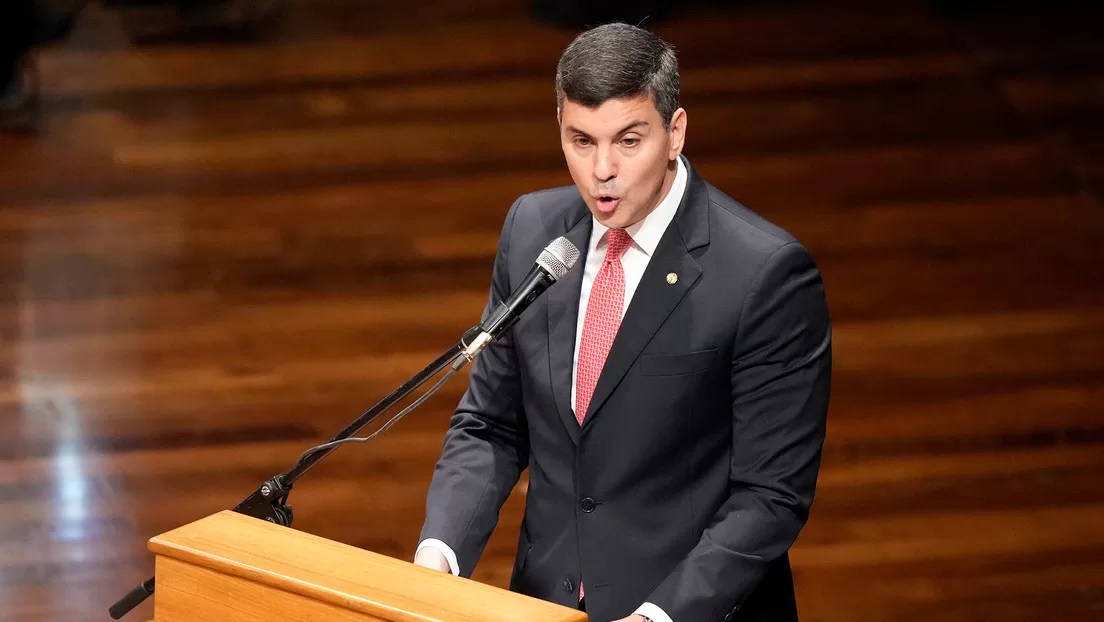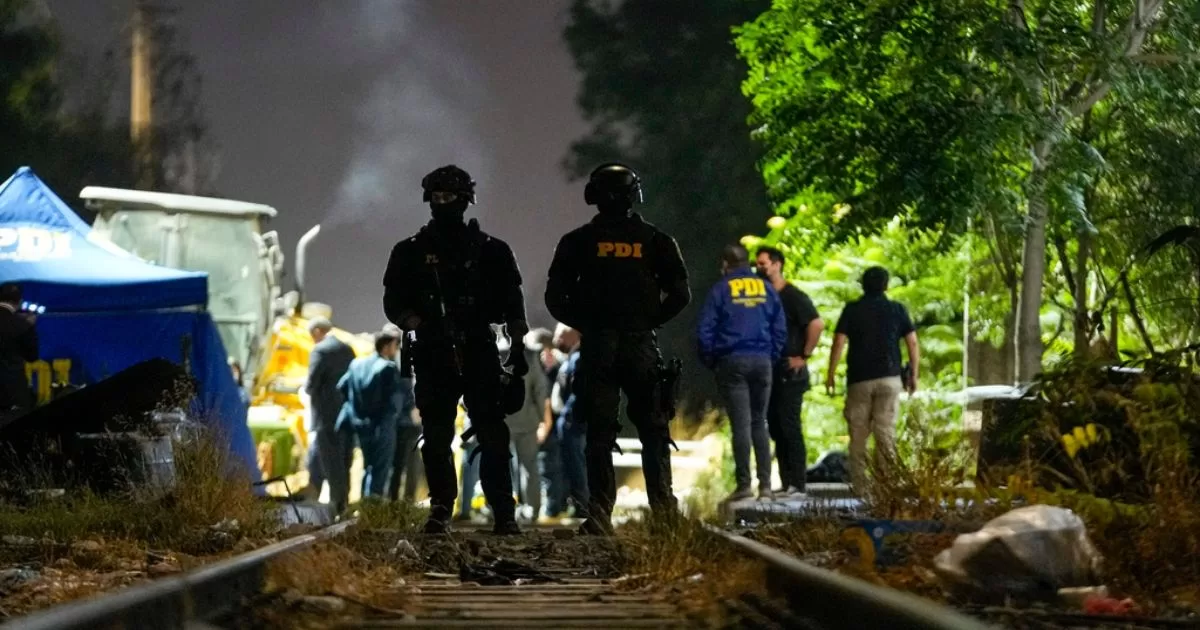This Tuesday he assumed as President of Paraguay Santiago Penawho since his days as a candidate announced that, if he were to win, would restore bilateral relations with the government of his counterpart Nicolás Madurosuspended since 2019 after the refusal of his predecessor, Mario Abdo Benítez (2018-2023), to recognize the results of the election that gave the Venezuelan a second term.
“The fact that Paraguay recognizes a government does not imply that we are a voice in principles and values. We believe that democracy must be enriched by broad electoral processes and the defense of human rights. Our voice will always be a voice of support for the Venezuelan people. I have said it publicly: My intention is to restore relations with Venezuela“He said when asked about the issue, shortly before the elections on April 30.
Then I also know promised to reopen the Embassy in Caracas and stressed that his country “has to strengthen its relations with Venezuela” based on coincidences, since it deals with matters of State and not personal or political sympathies.
The last Sunday #30AprI had a telephone contact with the newly elected President of Paraguay, Santiago Peña, to whom I expressed my congratulations on behalf of the Venezuelan people and the willingness to work for the good of our countries, through respect and unity. pic.twitter.com/szrQiMkuTA
— Nicolas Maduro (@NicolasMaduro) May 2, 2023
For his part, on May 2, Maduro reported on his X account – formerly Twitter – that he had spoken by phone with the elected president of Paraguay, Santiago Peña, and he said that in the exchange he had expressed his willingness to “work for the good” of the two nations, “through respect and union.”
media harassment
Although his position was well known, in the days that followed his victory, Peña was rebuked repeatedly by the press about the position his administration would take with respect to Venezuela and was even forced to issue opinions on the quality of democracy in that country. country.
Thus, for example, when asked about these matters, he distanced himself from his predecessor and called to remember that despite the “concerns” of the Colorado Party during the administration of former President Horacio Cartes (2013-2018), the ties were maintained. .
“We have to advance in an integration process and be respectful of each of the countries. We have every right to always be a firm voice in defense of human rights and to ask for fair, participatory elections and that there is no doubt about the authorities that have to judge, ”he considered.
When asked about the legitimacy of the Venezuelan government, Peña replied: “Today there is only one president in Venezuela and that president is called Nicolás Maduro. There is no alternative.”
He experienced a similar situation when he was interviewed by the US network CNN in Spanish, who openly criticized his phone call with Maduro and made accusations against the Paraguayan politician for supporting a government that Washington has accused of being undemocratic.
“I do not make value judgments if it is democratic, if it defends human rights, if it has participatory elections. (…) Denying recognition to a country, that this impedes cultural and commercial relations between countries, is not beneficial,” Peña replied.
relationships without conditions
In mid-May, Peña had the opportunity to refer again to his relationship with Venezuela, in the context of a bilateral meeting with Brazilian President Luiz Inácio Lula da Silva.
“We do not put conditions to restore relations. We are going to do it and we want to be a voice in the integration process, we also want to be a voice for the people of Venezuela, as Paraguay has historically been, which has received opposition leaders from Venezuela who often sought support from friendly countries. possibility of their claims being heard.” ratified.
The dignitary also asserted that he has a strong vocation for integration and that he is willing to strengthen all current regional schemes, “call it Unasur, Prosur, Celac or Mercosur, which is our closest area.”
“We have to be respectful of the visions of each of the leaders who are elected. We cannot ideologize diplomatic relations and integration”, insisted.
The return of Venezuela to Mercosur
Peña advanced to the media that the lifting of the veto that has weighed on Venezuela since 2017 in Mercosurwould be a topic of conversation with the presidents of Argentina and Uruguay at the future summit of presidents.
The high-level meeting held at the beginning of July in Iguazú, Argentina, had as its highlight the trade agreement with the European Union (EU), in view of the Celac-UE bi-regional summit, for which the re-entry of Caracas was relegated to a background.
When asked at the end of July about Bolivia’s definitive adherence to the mechanism, which has been pending since 2012, said to the Brazilian television station Canal Livre that he would like “Mercosur to strengthen itself as a bloc with its five members, before going to look for more members.”
With this he made it clear that, at least in his opinion, Venezuelan membership is not in questionalthough this does not translate into concrete actions to suspend the veto measure that in its day was promoted by the right-wing governments of Michel Temer (Brazil), Mauricio Macri (Argentina) and Horacio Cartes (Paraguay).
Petropar’s debt with PDVSA
Perhaps the issue of greatest interest between Caracas and Asunción is the debt of 300 million dollars that Petróleos Paraguayos (Petropar) acquired with the state-owned Petróleos de Venezuela (PDVSA), within the framework of an agreement signed more than a decade ago between the then Presidents Hugo Chávez and Nicanor Duarte.
According to the agreement, Petropar had 15 years to honor the debt with Venezuela, at an annual rate of 2%. Paraguay ignored the default interest and that motivated Caracas to raise the case to the International Chamber of Commerce (ICC), based in Paris, where no ruling has yet been made.
An investigation by The Washington Post, published in January 2021, revealed that The Paraguayan government asked Juan Guaidó to forgive the debt and that he sent emissaries to start negotiations, a species that was later confirmed by the Chief of Staff of the Presidency of that nation, Juan Ernesto Villamayor.
In an appearance before the Congress of his country, Villamayor reported that the proposal consisted of the cancellation of 50% of the principal of the debt and interest on arrears, in addition to the termination of the arbitration in the ICC, but it could not materialize because they noticed that it was not possible to demonstrate that the alleged government of Guaidó had the legal status of Venezuela.
At the outbreak of the scandal, members of Guaidó’s team tried to escape responsibility for having acted against the national interest of Venezuela, because this is classified as a serious crime under local law and carries severe prison sentences.
Javier Tronconis, a former oil executive who served as a representative in the management of Venezuelan assets abroad and the main target in the Petropar plot, assured that he acted with authorization, while others affirmed that he did it on his own initiative, in collusion with the Argentine lawyer Sebastian Vidal.
According to The Washington Post, Vidal is linked to the family of the outgoing president of Paraguay, Mario Abdo Benitez.
For its part, the National Assembly of Venezuela demanded the initiation of an investigation in the parliaments of Argentina and Paraguay to determine the responsibilities of those involved in these failed pacts, forged outside the law.
The future of debt
The absence of bilateral relations between Paraguay and Venezuela, as well as Abdo Benítez’s manifest animosity towards Maduro, have prevented delegations from the two countries from negotiating directly.
For this reason, when the Paraguayan president charged Caracas again at the III Celac-EU Summit, the Venezuelan vice president, Delcy Rodríguez, demanded payment of the commitments acquired by Petropar.
“I did not want to waste my time in the III EU-CELAC Summit to answer the errands of the US in the person of Mario Abdo Benítez. I only remind you that before leaving the presidency honor the debt you have with Venezuela instead of his empty monologue. Venezuela will never bow down!” wrote the official in her X account.
Faced with this, Santiago Peña admitted the amount of the debt –which was also the subject of controversy– claimed by Venezuela and expressed his willingness to pay it, but left the resolution in the hands of the ICC, so it remains unclear how and when financial commitment would be honored.
“The position is that there is an arbitration in the Paris Chamber of Commerce and that arbitration is going to have to decide between the position of Venezuela and the position of Paraguay, which is a different position,” he said in statements replicated by local media.


